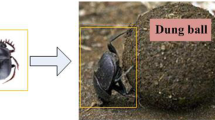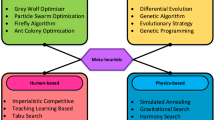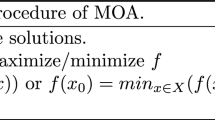Abstract
This paper presents a learnable tabu search (TS) guided by estimation of distribution algorithm (EDA), called LTS-EDA, for maximum diversity problem. The LTS-EDA introduces knowledge model and can extract knowledge during the search process of TS, and thus it adopts dual or cooperative evolution/search structure, consisting of probabilistic model space in clustered EDA and solution space searched by TS. The clustered EDA, as a learnable constructive method, is used to create a new starting solution, and the simple TS, as an improvement method, attempts to improve the solution created by the clustered EDA in the LTS-EDA. A distinguishing feature of the LTS-EDA is the usage of the clustered EDA with effective linkage learning to guide TS. In the clustered EDA, different clusters (models) focus on different substructures, and the combination of information from different clusters (models) effectively combines substructures. The LTS-EDA is tested on 50 large size benchmark problems with the size ranging from 2,000 to 5,000. Simulation results show that the LTS-EDA is better than the advanced algorithms proposed recently.


Similar content being viewed by others
References
Andrade PMD, Ochi LS, Martins SL (2005) GRASP with path relinking for the maximum diversity problem. In: Nikoletseas S (ed) Proceedings 4th International Workshop on Efficient Experimental Algorithms WEA, vol 3539. Springer, Berlin, pp 558–569
Aringhieri R, Cordone R (2011) Comparing local search metaheuristics for the maximum diversity problem. J Oper Res Soc 62(2):266–280
Aringhieri R, Cordone R, Melzani Y (2008) Tabu search versus GRASP for the maximum diversity problem. 4OR Q J Oper Res 6(1):45–60
Baluja S (1994) Population-based incremental learning: a method for integrating genetic search based function optimization and competitive learning. Carnegie Mellon Univ., Pittsburgh, PA Tech. Rep. CMU-CS-94-163
Baluja S, Davies S (1997) Using optimal dependency-trees for combinatorial optimization: learning the structure of the search space. In: Proceedings of 1997 International Conference on Machine and Learning, pp 30–38
Baluja S, Davies S (1998) Fast probabilistic modeling for combinatorial optimization. In: Proceedings of 15th National Conference Artificial Intelligence (AAAI-98), pp 469–476
Beasley JE (2000) OR-Library: Unconstrained binary quadratic programming. http://people.brunel.ac.uk/∼mastjjb/jeb/orlib/bqpinfo.htm
de Bonet JS, Isbell CL Jr, Viola P (1994) MIMIC: finding optima by estimating probability densities. In: Mozer MC, Jordan MI, Petsche T (eds) Advances in neural information processing systems, vol 9. MIT Press, Cambridge, pp 424–430
Brimberg J, Mladenović N, Urošević D, Ngai E (2009) Variable neighborhood search for the heaviest k-subgraph. Comput Oper Res 36(11):2885–2891
Derrac J, García S, Molina D, Herrera F (2011) A practical tutorial on the use of nonparametric statistical tests as a methodology for comparing evolutionary and swarm intelligence algorithms. Swarm Evol Comput 1(1):3–18
Duarte A, Martí R (2007) Tabu search and GRASP for the maximum diversity problem. Eur J Oper Res 178(1):71–84
Emmendorfer LR, Pozo ATR (2009) Effective linkage learning using low-order statistics and clustering. IEEE Trans Evol Comput 13(6):1233–1246
Gallego M, Duarte A, Laguna M, Martí R (2009) Hybrid heuristics for the maximum diversity problem. Comput Optim Appl 44(3):411–426
García S, Molina D, Lozano M, Herrera F (2009) A study on the use of nonparametric tests for analyzing the evolutionary algorithms’ behaviour: a case study on the CEC’2005 special session on real parameter optimization. J Heurist 15(6):617–644
García S, Fernández A, Luengo J, Herrera F (2010) Advanced nonparametric tests for multiple comparisons in the design of experiments in computational intelligence and data mining: experimental analysis of power. Inform Sci 180(10):2044–2064
Glover F, Lv Z, Hao J-K (2010) Diversification-driven tabu search for unconstrained binary quadratic problems. 4OR Q J Oper Res 8(3):239–253
Guturu P, Dantu R (2008) An impatient evolutionary algorithm with probabilistic Tabu search for unified solution of some NP-Hard problems in graph and set theory via clique finding. IEEE Trans Syst Man Cybern Part B 38(3):645–666
Hao J-K (2011) Memetic algorithms for discrete optimization. In: Neri F, Cotta C, Moscato P (eds) Handbook of memetic algorithms. Springer, Berlin (in press)
Harik G (1999) Linkage learning via probabilistic modeling in the ECGA. Springer, Berlin
Harik GR, Lobo FG, Goldberg DE (1999) The compact genetic algorithm. IEEE Trans Evol Comput 3(4):287–297
Hauschild M, Pelikan M, Sastry K, Lima C (2009) Analyzing probabilistic models in hierarchical BOA. IEEE Trans Evol Comput 13(6):1199–1217
James T, Rego C, Glover F (2009) Multistart tabu search and diversification strategies for the quadratic assignment problem. IEEE Trans Syst Man Cybern Part A Syst Hum 39(3):579–596
Katayama K, Narihisa H (2004) An evolutionary approach for the maximum diversity problem. In: Hart W, Krasnogor N, Smith JE (eds) Recent advances in memetic algorithms. Spinger, Berlin, pp 31–47
Kochenberger G, Glover F, Alidaee B, Rego C (2004) A unified modeling and solution framework for combinatorial optimization problems. OR Spectr 26(2):1–14
Kuo CC, Glover F, Dhir KS (1993) Analyzing and modeling the maximum diversity problem by zero-one programming. Decis Sci 24:1171–1185
Lozano M, Garca-Martnez C (2010) Hybrid metaheuristics with evolutionary algorithms specializing in intensification and diversification: overview and progress report. Comput Oper Res 37(3):481–497
Lozano JA, Zhang Q, Larrañaga P (2009) Guest Editorial: Special issue on evolutionary algorithms based on probabilistic model. IEEE Trans Evol Comput 13(6):1197–1198
Lozano M, Molina D, García-Martínez C (2011) Iterated greedy for the maximum diversity problem. Eur J Oper Res 214(1):31–38
Lv Z, Hao J-K (2010) A memetic algorithm for graph colorin. Eur J Oper Res 203(1):241–250
Lv Z, Glover F, Hao J-K (2010) A hybrid metaheuristic approach to solving the UBQP problem. Eur J Oper Res 207(3):1254–1262
Martí R, Moreno-Vega JM, Duarte A (2011) Advanced multi-start methods. In: Gendreau M, Potvin J-Y (eds) Handbook of Metaheuristics, International series in operations research & management Science, vol 146, pp 265–281
Martí R, Gallego M, Duarte A (2011) Heuristics and metaheuristics for the maximum diversity problem. J Heurist (in press). doi:10.1007/s10732-011-9172-4
Martí L, García J, Berlanga A, Molina JM (2009) On the model-building issue of multi-objective estimation of distribution algorithms. In: Corchado E et al (eds) Proceeding of the 4th international conference on hybrid artificial intelligence system, LNAI, vol. 5572. Springer, Berlin, pp 293–300
Martí R, Gallego M, Duarte A (2010) A branch and bound algorithm for the maximum diversity problem. Eur J Oper Res 200(1):36–44
Misevicius A, Lenkevicius A, Rubliauskas D (2006) Iterated tabu search: an improvement to standard tabu search. Inform Technol Control 35(3):187–197
Mühlenbein H, Paass G (1996) From recombination of genes to the estimation of distributions I. binary parameters. In: Proceedings of International Conference on Evolution and Computers, PPSN IV, pp 178–187
Mühlenbein H, Mahnig T, Rodriguez A (1999) Schemata, distributions and graphical models in evolutionary optimization. J Heurist 5:215–247
Palubeckis G (2004) Multistart tabu search strategies for the unconstrained binary quadratic optimization problem. Ann Oper Res 131(1–4):259–282
Palubeckis G (2006) Iterated tabu search strategies for the unconstrained binary quadratic optimization problem. Informatica 17(2):279–296
Palubeckis G (2007) Iterated tabu search for the maximum diversity problem. Appl Math Comput 189(1):371–383
Peña J, Lozano J, Larrañaga P (2005) Globally multimodal problem optimization via an estimation of distribution algorithm based on unsupervised learning of Bayesian networks. Evol Comput 13(1):43–66
Pelikan M, Mühlenbein H (1999) The bivariate marginal distribution algorithm. In: Roy R, Furuhashi T, Chawdhry PK (eds) Advances in soft computing–engineering design and manufacturing. Springer, London pp 521–535
Pelikan M, Goldberg DE, Cantú-paz EE (2000) Linkage problem, distribution estimation, and Bayesian networks. Evol Comput 8(3):311–340
Platel MD, Schliebs S, Kasabov N (2009) Quantum-inspired evolutionary algorithm: a multimodel EDA. IEEE Trans Evol Comput 13(6):1218–1232
Santana R, Larrañaga P, Lozano JA (2009) Research topics in discrete estimation of distribution algorithms based on factorizations. Memet Comput 1(1):35–54
Silva GC, de Andrade MRQ, Ochi LS, Martins SL, Plastino A (2007) New heuristics for the maximum diversity problem. J Heurist 13(4):315–336
Wang L, Fang C (2010) An effective estimation of distribution algorithm for the multi-mode resource-constrained project scheduling problem. Comput Oper Res 39(2):449–460
Wang L, Fang C (2011) An effective shuffled frog-leaping algorithm for multi-mode resource-constrained project scheduling problem. Inform Sci 181(20):4804–4822
Wang J, Zhou Y, Yin J, Zhang Y (2009) Competitive Hopfield network combined with estimation of distribution for maximum diversity problems. IEEE Trans Syst Man Cybern Part B Cybern 39(4):1048–1066
Wang J, Kuang Z, Xu X, Zhou Y (2009) Discrete particle swarm optimization based on estimation of distribution for polygonal approximation problems. Expert Syst Appl 36(5):9398–9408
Xin B, Chen J, Zhang J, Fang H, Peng Z-H (2011) Hybridizing differential evolution and particle swarm optimization to design powerful optimizers: a review and taxonomy. IEEE Trans Systems Man Cybern Part C Appl Rev (in press)
Zhang Q, Sun J (2006) Iterated local search with guided mutation. In: Proceedings of IEEE Congress on Evolutionary Computation, pp 924–929
Zhang Q, Sun J, Tsang E (2005) Evolutionary algorithm with guided mutation for the maximum clique problem. IEEE Trans Evol Comput 9(2):192–200
Zhang Q, Sun J, Xiao G, Tsang E (2007) Evolutionary algorithms refining a heuristic: a hybrid method for shared-path protections in WDM networks under SRLG constraints. IEEE Trans Syst Man Cybern Part B 37(1):51–61
Zhang Q, Sun J, Tsang E (2007) Combinations of estimation of distribution algorithms and other techniques. Int J Autom Comput 4(3):273–280
Acknowledgments
This work was supported in part by the National Natural Science Foundation of China (60805026, 60905038, 61070076, 61033010), the Zhujiang New Star of Science and Technology in Guangzhou City (2011), and the Fundamental Research Funds for the Central Universities (10lgpy32).
Author information
Authors and Affiliations
Corresponding author
Rights and permissions
About this article
Cite this article
Wang, J., Zhou, Y., Cai, Y. et al. Learnable tabu search guided by estimation of distribution for maximum diversity problems. Soft Comput 16, 711–728 (2012). https://doi.org/10.1007/s00500-011-0780-6
Published:
Issue Date:
DOI: https://doi.org/10.1007/s00500-011-0780-6




